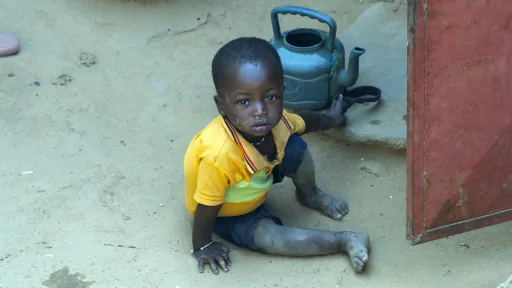Opinion Editorial Archive April, 2018: Arrested, Development

Last month news broke that a man and a woman had been arrested on charges of child abuse. The victims of the alleged abuse are the couple's own children, aged 11, 13 and 14. They were found living in a makeshift, wooden hut without electricity, heat or running water.
When I heard the news I immediately related to it: recently I stayed in similar accommodation in Mali, West Africa. I recalled taking this month's photo there. This child also lives in a makeshift, wooden hut without electricity, heat or running water. He is an indigenous Dogon boy from the village of Teli. Teli is a small and very isolated village with little of what we would consider development. The village is too poor for that and what little development does exist is funded by outside aid organizations. I saw no indication of abuse toward him or any other children in his village. When he is old enough, in a few years' time, he will probably attend the village school. If being born into poverty makes him a victim of abuse then every parent in his village is guilty along with every Dogon parent, most Malian parents and, in fact, most African parents. The real threat of abuse comes not from his parents but, as we saw just a few days ago, the terrorists who are increasingly operating in central Mali.
At the South by Southwest Technology Festival last month we learned that, for about a tenth of the cost of the alleged child abuse perpetrators' bail, a small home can now be 3D-printed. To be tested in the field later this year in El Salvador, this development could help raise the living conditions of people like the Dogon.
I was still in Africa when a different news story broke that also contained an allegation. African countries were, allegedly, referred to as "shithole countries." I don't know whether Mali is supposed to be one of those countries, but I do know that Dogon Country in Mali is one of the most welcoming places I have ever visited. If the allegation is true, the word "shithole" was surely being used in a figurative sense. As you enter Teli a sign makes it clear that defecating in the village is not allowed. That sign is clearly aimed at the visitor — the inhabitants know not to do it.
Like this boy's parents, the arrested parents are very poor. Mona Kirk and Daniel Panico both pleaded not guilty to the child abuse charges. The place where their children were found living is not a "shithole" in the figurative sense — it is a "shithole" in the literal sense. The makeshift, wooden hut was surrounded by human feces. Nor did the arrests take place in Mali or anywhere in Africa; instead they took place in California in the United States. Many people were quick to take to social media proclaiming, in some cases, that people like Kirk and Panico should not be allowed to have children. If people reacted that way after visiting Dogon Country in Mali, the Dogon people would be wiped out in one generation. Others took a more humanitarian approach and enough funds have now been raised to provide a permanent home for Kirk and Panico. It is unclear yet whether their children will be returned to them. Before criticizing others, we should sometimes look in our own back yard first.
If you enjoyed reading this month's opinion editorial, please consider supporting independent, advertising-free journalism by buying us a coffee to help us cover the cost of hosting our web site. Please click on the link or scan the QR code. Thanks!

